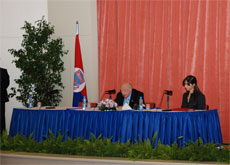 The 40th anniversary of the "Prague Spring" was commemorated at Bilkent University, with a conference titled "Democracy Deprived." A photographic exhibition titled "Alexander Dubcek in Ankara and Prague Spring, plus a charity concert organized by the Rotary Clubs of Çankaya and Yıldız were also held. The events were the culmination of a joint effort between the Austrian, Czech Republic and Slovak embassies.
The 40th anniversary of the "Prague Spring" was commemorated at Bilkent University, with a conference titled "Democracy Deprived." A photographic exhibition titled "Alexander Dubcek in Ankara and Prague Spring, plus a charity concert organized by the Rotary Clubs of Çankaya and Yıldız were also held. The events were the culmination of a joint effort between the Austrian, Czech Republic and Slovak embassies.
Esra Doğramacı presided over the conference as Master of Ceremonies on behalf of the Department of International Relations. Süleyman Demirel, the 9th President of Turkey, delivered the keynote address reflecting on the meanings of democracy and liberalism, and how Turkey provided an intellectual arena for Czechoslovakia, Slovakia and other countries suppressed by the Soviet Union during the Cold War era in Europe. President Demirel then discussed the meanings of the events of 40 years ago for current times. Pivotal historical events such as the Prague Spring, he said, could be understood in the expression, "You can crush the flower but you cannot stop the Spring."
The first panelists were Pavel Zacek, the Director of the Institute for the Study of Totalitarian Regimes, and Prof. Dr. Hüseyin Bağcı from the Department of International Relations at METU. The historical context was the Russian suppression on Czech and Slovak peoples. Professor Bağcı pointed out that, while Alexander Dubcek was the Speaker of the Czechoslovakian Parliament, Turkey was one of the few nations that recognized his contributions to democracy, awarding him for his efforts, so people would remember his important work well into the future. He also noted that Turkey has always been an important part of European political developments, a theme President Demirel had also discussed.
Mr. Jaroslav Danika, a Slovak journalist, opened the second panel, titled
"Alexander Dubcek and his Personal Contribution to Democracy." He explained that Alexander Dubcek, the first leader of the Communist Party in Czechoslovakia, was fighting against a totalitarian regime, but was also part of it, arguing that rather than being democratic leader, he was an opportunist and was successful because of his popular appeal rather than his democratic appeal. This panel generated colorful interchanges from audience members as Dubceks role in the Prague Spring and beyond was contested. He also described Alexander Dubcek as "the Barack Obama of the 1960s." Mr. Özgen Acar of Cumhuriyet newspaper, who holds the distinction of meeting and interviewing Dubcek, provided his personal views and memoirs, contesting what Daniska offered.
İlber Ortaylı, Professor of History at Galatasaray and Bilkent Universities, and the Head of the Topkapı Museum; and Austrian. Ambassador Klas Daublebsky, Head of the Consular Department of the Austrian Embassy in Prague in 1968, and later the Austrian Ambassador to Czechoslovakia; concluded the conference with the third panel, again with their personal memories of the time. When comparing the events of 1968 to political upheavals around the world, the Czech Ambassador, Eva Filipi, who is also a specialist in Ottoman studies, shared her personal experiences as a student during the Prague Spring such as her protest activities and imprisonment, to illustrate that for any viable change to occur, it must be generated from within, regardless of external support, and can come with a personal price.
Burcu Kamarlı (MIAPP) with contributions from Esra Doğramacı







